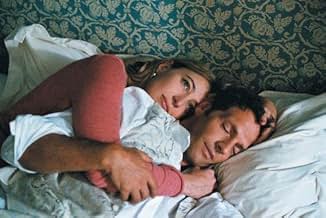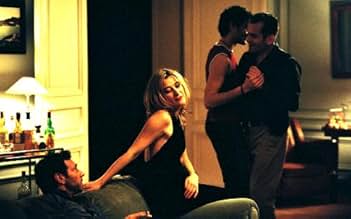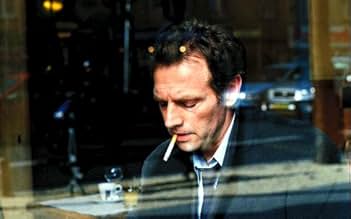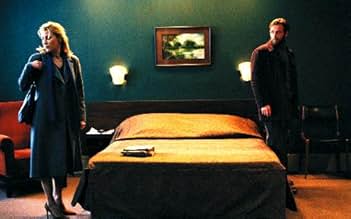Five stages in the romance between a woman and a man.Five stages in the romance between a woman and a man.Five stages in the romance between a woman and a man.
- Director
- Writers
- Stars
- Awards
- 1 win & 2 nominations total
Valeria Bruni Tedeschi
- Marion
- (as Valeria Bruni-Tedeschi)
Ninon Brétécher
- Sophie
- (as Ninon Bretecher)
- Director
- Writers
- All cast & crew
- Production, box office & more at IMDbPro
Featured reviews
The reverse chronology brings together what all too often tears us apart, wait it's love, love that tears us apart. Marriage really is a different thing altogether.
The film feels to a degree like flipping through old photographs, nostalgia is a form of pain, right? What was interesting was to see the actors really portraying quite different characters in the five sets, although had I seen the French Remix where the scenes are re-reversed, perhaps it would have all seemed more fated and just an unwrapping of a bitter, broken wedding gift.
I did wonder if the movie was filmed in proper chronological order.
There is something about maid Marion's parents, that is placed on a very tiny pedestal, without much explanation. I found compassion in watching Valerie Bruni-Tedeschi here...while her lesser half did not get much of a fair chance at redemption.
All of us, and all of our partners are flawed. But perhaps not all relationships are fatally flawed. Find someone emotionally compatible and give it a shot, maybe savor the best memories periodically. Good luck...
The film feels to a degree like flipping through old photographs, nostalgia is a form of pain, right? What was interesting was to see the actors really portraying quite different characters in the five sets, although had I seen the French Remix where the scenes are re-reversed, perhaps it would have all seemed more fated and just an unwrapping of a bitter, broken wedding gift.
I did wonder if the movie was filmed in proper chronological order.
There is something about maid Marion's parents, that is placed on a very tiny pedestal, without much explanation. I found compassion in watching Valerie Bruni-Tedeschi here...while her lesser half did not get much of a fair chance at redemption.
All of us, and all of our partners are flawed. But perhaps not all relationships are fatally flawed. Find someone emotionally compatible and give it a shot, maybe savor the best memories periodically. Good luck...
At 5x2 we see the course of a relationship from end to beginning. The reverse chronology of events is now a well established editing technique which almost always works and intrigues the viewer.
The personalities of both Marion and Gilles are established fairly quickly, but the reasoning behind their actions is usually explained at a later time. In fact, this shows how well written 5x2 is, because throughout all five episodes the characters of the protagonists don't change, their behavior has changed due to actions of the other part.
Both actors deliver high caliber performances and their faces write perfectly on the screen. They do create a chemistry when needed (and a lack of again when needed). Can you believe by the way that beautiful Valeria Bruni is forty years old?
The vintage Italian music adds color to the story and Ozon shows he is an accomplished director. As the movie ends he gives us one of the most idyllic scenes ever filmed.
The personalities of both Marion and Gilles are established fairly quickly, but the reasoning behind their actions is usually explained at a later time. In fact, this shows how well written 5x2 is, because throughout all five episodes the characters of the protagonists don't change, their behavior has changed due to actions of the other part.
Both actors deliver high caliber performances and their faces write perfectly on the screen. They do create a chemistry when needed (and a lack of again when needed). Can you believe by the way that beautiful Valeria Bruni is forty years old?
The vintage Italian music adds color to the story and Ozon shows he is an accomplished director. As the movie ends he gives us one of the most idyllic scenes ever filmed.
"5x2" is not the first film to explore a relationship by going backwards from its end to its beginning (Pinter's "Betrayal" comes to mind let alone the mystery in "Memento").
But writer/director François Ozon, aided by superb acting, uses the structure for a thoughtful and intriguing commentary on love and marriage.
The first scene sets up our curiosity as while a lawyer dryly reads the divorce agreement, letting us know the cold facts of the marriage, there is palpable electricity between the about to be ex-wife and husband such that we are not surprised when they immediately head to a hotel, as it turns out their relationship started in a hotel.
We are introduced to the complexities between this couple as their layers are played out through a sexual encounter that is open to "he said, she said" interpretations that will continue as we flashback to key points in their relationship. The other four incidents show them as parents, at the birth of their child, at their wedding and at their meeting, all played out in relation to her parents' long-time conflicted marriage and his brother's homosexual arrangements, amid other encounters.
Valeria Bruni Tedeschi is so luminous as "Marion" that I'm not sure if it's her beautiful acting, as she is in turn up-tight, conflicted, sensual, fragile or aggressive, or her character who changes or that François Ozon is such a sensitive director of women, as he showed in "Swimming Pool" and "Under the Sand (Sous le sable)", that I favored her character, even if we gradually learn that she may or may not be as much of a victim as it seems and she is as much influenced by physical imperatives as he is. Stéphane Freiss plays virtually the opposite of his caring husband in "Le Grand Rôle," even if it becomes less and less clear he's the S.O.B. he at first could appear to be, or if his character experiences any changes or learns anything through serial somewhat monogamy, especially because some details in their past are just left mysterious.
The film is certainly not optimistic about love being an effective basis for a man and a woman to sustain a long term relationship and it leaves open-ended for a gendered discussion about whether that applies to the particulars of these individuals, or to them as French or as Europeans, vs. universals, as Americans would probably interpret their interactions differently than other audiences.
Certainly, in a frankly sexually mature film it's nice to see non-Hollywood bodies, of a zaftig woman and a guy without a personal trainer credit listed.
The frequent use of Paolo Conte songs on the soundtrack add to the ironic feeling surrounding the film, even if the lyrics aren't translated in the many white-on-white subtitles.
Going off into the sunset, and the cinematography and production design, from dark to light, throughout are lovely, hasn't had such an ironic conclusion since the original "Planet of the Apes."
But writer/director François Ozon, aided by superb acting, uses the structure for a thoughtful and intriguing commentary on love and marriage.
The first scene sets up our curiosity as while a lawyer dryly reads the divorce agreement, letting us know the cold facts of the marriage, there is palpable electricity between the about to be ex-wife and husband such that we are not surprised when they immediately head to a hotel, as it turns out their relationship started in a hotel.
We are introduced to the complexities between this couple as their layers are played out through a sexual encounter that is open to "he said, she said" interpretations that will continue as we flashback to key points in their relationship. The other four incidents show them as parents, at the birth of their child, at their wedding and at their meeting, all played out in relation to her parents' long-time conflicted marriage and his brother's homosexual arrangements, amid other encounters.
Valeria Bruni Tedeschi is so luminous as "Marion" that I'm not sure if it's her beautiful acting, as she is in turn up-tight, conflicted, sensual, fragile or aggressive, or her character who changes or that François Ozon is such a sensitive director of women, as he showed in "Swimming Pool" and "Under the Sand (Sous le sable)", that I favored her character, even if we gradually learn that she may or may not be as much of a victim as it seems and she is as much influenced by physical imperatives as he is. Stéphane Freiss plays virtually the opposite of his caring husband in "Le Grand Rôle," even if it becomes less and less clear he's the S.O.B. he at first could appear to be, or if his character experiences any changes or learns anything through serial somewhat monogamy, especially because some details in their past are just left mysterious.
The film is certainly not optimistic about love being an effective basis for a man and a woman to sustain a long term relationship and it leaves open-ended for a gendered discussion about whether that applies to the particulars of these individuals, or to them as French or as Europeans, vs. universals, as Americans would probably interpret their interactions differently than other audiences.
Certainly, in a frankly sexually mature film it's nice to see non-Hollywood bodies, of a zaftig woman and a guy without a personal trainer credit listed.
The frequent use of Paolo Conte songs on the soundtrack add to the ironic feeling surrounding the film, even if the lyrics aren't translated in the many white-on-white subtitles.
Going off into the sunset, and the cinematography and production design, from dark to light, throughout are lovely, hasn't had such an ironic conclusion since the original "Planet of the Apes."
This film is about 5 segments of the relationship between Gilles and Marion in reverse chronological order.
I thought the reverse chronological order would make it as confusing as "Memento", but actually it is very simple to understand. The film highlights 5 different time segments that is pivotal to the relationship. What happens in between the segments is not mentioned. It leaves the viewers much room for imagination and interpretation.
It is a story about real human beings. No one is flawless. The carnal desire of Gilles, and his shameless expression of it, destroys his love life. Valerie's passionless attitude and negativity destroys her relationship. Marion, on the other hand, gets repeatedly disappointed with life. Everything in the film is so real and close to us, unlike most films that portray fairytale couples or unrealistic lives.
I particularly like the childbirth segment, as emotions are well portrayed and affecting. I think this film is good, but not as groundbreaking as I expected it to be.
I thought the reverse chronological order would make it as confusing as "Memento", but actually it is very simple to understand. The film highlights 5 different time segments that is pivotal to the relationship. What happens in between the segments is not mentioned. It leaves the viewers much room for imagination and interpretation.
It is a story about real human beings. No one is flawless. The carnal desire of Gilles, and his shameless expression of it, destroys his love life. Valerie's passionless attitude and negativity destroys her relationship. Marion, on the other hand, gets repeatedly disappointed with life. Everything in the film is so real and close to us, unlike most films that portray fairytale couples or unrealistic lives.
I particularly like the childbirth segment, as emotions are well portrayed and affecting. I think this film is good, but not as groundbreaking as I expected it to be.
5x2 comes as a slight let-down following director Francois Ozon's recent critical and commercial success with Swimming Pool.Ozon's decision to structure the film in an anti-linear fashion is nothing original and he himself admits he was influenced by Jane Campion's little-known TV film Two Friends (1985) which used the same structure. Ozon chooses 5 crucial scenes from the life of Marion and Gilles, a middle-class couple with a son, Nicholas, whose married life quickly disintegrates into divorce. Ozon begins with the austere divorce, finishing with the moment this would-be-couple met.
The reverse structure allows the viewer to consider what went wrong and decipher why the marriage ended so bitterly. It is fairly obvious the reasons why they divorced, but Ozon and his frequent collaborator, Emmanuelle Bernhein, are as interested in the psychological worlds of these two people as their mundane reality.
The film works for the most part, but some scenes are unbelievable: Gilles's boastful confession at the party with his brother; the scene in the woods with Marion and an American tourist. These scenes undermine the subtle nature Ozon employs elsewhere. He explains too much, which isn't his style. A better edit would have made this an even better film.
As for the music, the corny 1960's Italian love songs used to close each segment are plain awful. The triviality of the songs might offer an ironic counterbalance to what is happening on screen, but the effect is of a sneering, sardonic detachment on behalf of the director. It's as if Ozon wants to dismiss every aspect of romantic culture as a fallacy.The best musical segment is at the end where Ozon's longtime composer Philippe Rombi returns some panache to the film's audio sensibilities. Special mention should go to Paolo Conte's haunting Sparring Partner which is used in the dinner scene and in the final credits.
The acting is excellent,and the closing frame is a masterstroke.But it doesn't merit that many repeat viewings as his earlier Swimming Pool did.
The reverse structure allows the viewer to consider what went wrong and decipher why the marriage ended so bitterly. It is fairly obvious the reasons why they divorced, but Ozon and his frequent collaborator, Emmanuelle Bernhein, are as interested in the psychological worlds of these two people as their mundane reality.
The film works for the most part, but some scenes are unbelievable: Gilles's boastful confession at the party with his brother; the scene in the woods with Marion and an American tourist. These scenes undermine the subtle nature Ozon employs elsewhere. He explains too much, which isn't his style. A better edit would have made this an even better film.
As for the music, the corny 1960's Italian love songs used to close each segment are plain awful. The triviality of the songs might offer an ironic counterbalance to what is happening on screen, but the effect is of a sneering, sardonic detachment on behalf of the director. It's as if Ozon wants to dismiss every aspect of romantic culture as a fallacy.The best musical segment is at the end where Ozon's longtime composer Philippe Rombi returns some panache to the film's audio sensibilities. Special mention should go to Paolo Conte's haunting Sparring Partner which is used in the dinner scene and in the final credits.
The acting is excellent,and the closing frame is a masterstroke.But it doesn't merit that many repeat viewings as his earlier Swimming Pool did.
Did you know
- TriviaIn the French edition of the DVD, the director offers a version of the movie titled "2 x 5". This version shows the five sequences in the chronological order, from the moment the couple meets till their divorce. Subtle editing work has been applied to make the movie work.
- GoofsThe scene where the American came to Marion during the wedding night and introduced himself who arrived in France today and would leave tomorrow for LA. Who would just do that? It's just lame.
(Answer: someone not coming from the USA, for instance.)
- How long is Five Times Two?Powered by Alexa
Details
- Release date
- Country of origin
- Official sites
- Languages
- Also known as
- Vida en pareja
- Filming locations
- Production companies
- See more company credits at IMDbPro
Box office
- Budget
- €5,250,784 (estimated)
- Gross US & Canada
- $128,752
- Opening weekend US & Canada
- $15,667
- Jun 12, 2005
- Gross worldwide
- $7,444,906
- Runtime
- 1h 30m(90 min)
- Sound mix
- Aspect ratio
- 1.85 : 1
Contribute to this page
Suggest an edit or add missing content




























